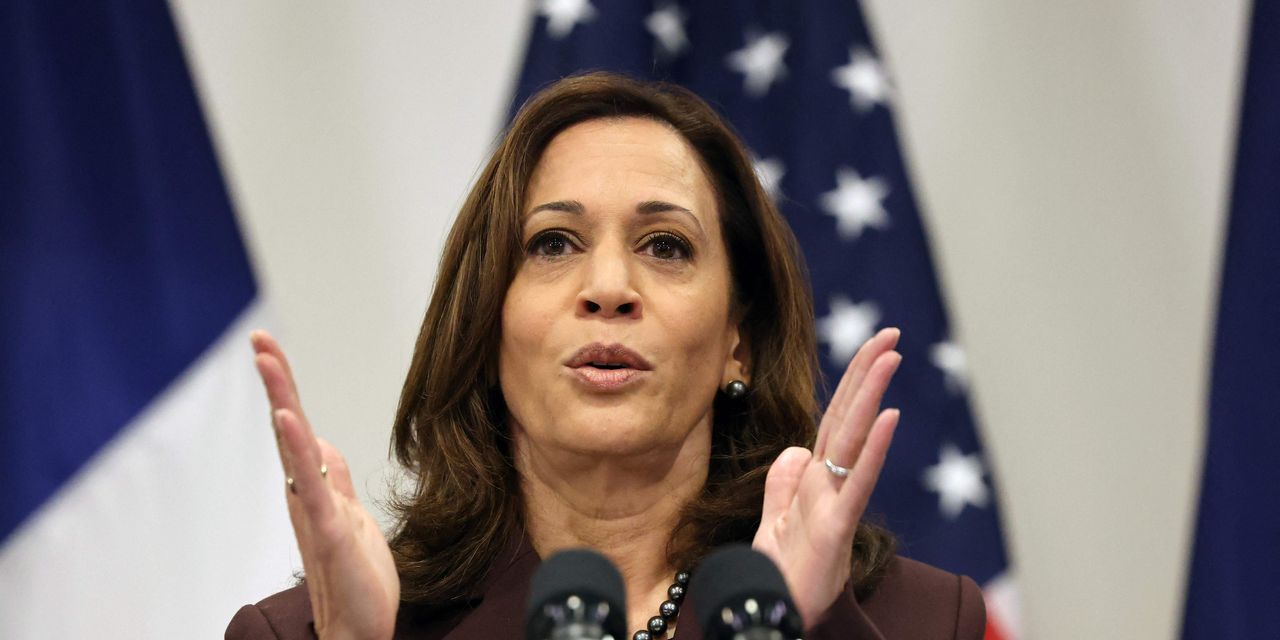The Biden administration released a plan on Monday it thinks can help “fast track” the uptake of electric-vehicle use in the U.S. by building 500,000 charging stations across the country.
Vice President Kamala Harris made the announcement at a government facility in Maryland, extending the Biden team’s news last week that it will push via executive order for greener energy throughout federal buildings and for its vehicle fleets.
The Monday announcement is part of the $1 trillion infrastructure law Biden signed last month, which authorizes the charging stations and sets aside $5 billion for states, with a goal to build a national charging network. The law also provides an additional $2.5 billion for local grants to support charging stations in rural areas and in disadvantaged communities.
“The auto industry is clearly moving toward electric. We need to make the shift faster and make sure it is driven by the United States. That means manufacturing millions of electric cars, trucks and buses right here in our country,” Harris said.
Barron’s on MarketWatch: Elon Musk is named Time’s person of the year. Why the magazine chose the EV and space pioneer.
The U.S. lags other major economies in EV adoption. Right now, the U.S. market share of plug-in EV sales is one-third the size of the Chinese EV market, for example. China is one of the U.S.’s primary rivals on trade, including in the renewable-energy space, as world leaders take steps to slow global warming.
The administration has set an ambitious target of a 50% EV share of all new automobile buying in the U.S. by 2030, but fast, convenient and reliable charging remains a wrinkle. Most EV owners charge at home, and limit the distance of their EV trips.
“When we ask people what is the biggest barrier so that they’ll buy an electric car, the answer is almost always figuring out where and how to charge,” Harris said.
The new EV-charging strategy establishes a joint EV office between the federal Energy and Transportation departments; issues guidance and standards for states; and ensures consultations with manufacturers, state and local governments, environmental justice and civil rights groups, tribes and others.
The Biden administration has made it clear that the private sector, as well as states and cities, will have to be on board to secure such a large network.
Aaron Fisher, head of EVPassport, a venture-backed public benefit
corporation, said one of the biggest challenges is that competition in the space means not all drivers can access any charging station they drive up to.
“Creating thousands of closed networks at commercial properties, hotels, parking garages, gas stations, etc., won’t drive EV adoption,” Fisher said. “The $7.5 billion in funding [within the infrastructure law] needs to be driven to open networks that don’t require drivers to download specific apps, set up billing accounts, etc., to ensure they’re not stranded on the side of the road,” he said.
“Connected infrastructure is going to be the backbone of driving a convenient and frictionless experience which will result in more EV adoption,” he added.
The EV-charging move is also part of Biden’s goal of net-zero greenhouse gas emissions by 2050 for all of the U.S., a target largely in line with other major nations.
Some Republicans have said this focus on EVs is mistimed when Americans are dealing with a spike in gasoline
RB00,
-0.34%
and natural gas
NG00,
+0.18%
prices. Fossil-fuel trade groups made the same argument, including to Democratic Sen. Joe Manchin, who is seen as a key vote as the Biden administration and Democrats look to more EV and climate-change spending initiatives in the pending Build Back Better bill.
Biden last month ordered a record 50 million barrels of oil released from America’s strategic reserve, as a move to soften some of the near-term price jump.
